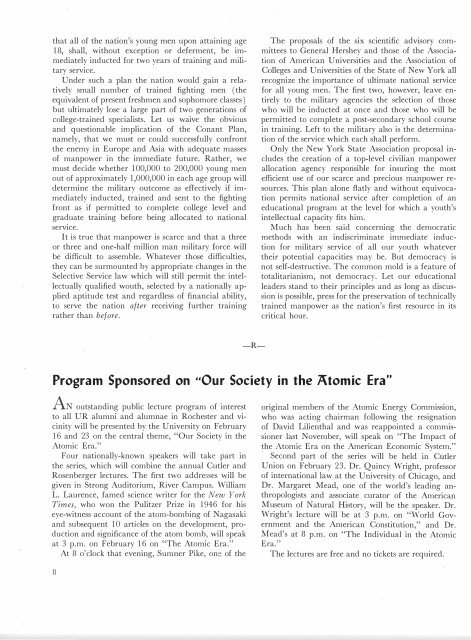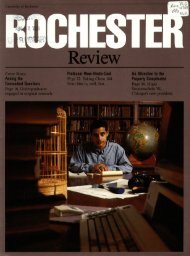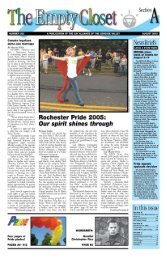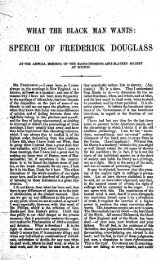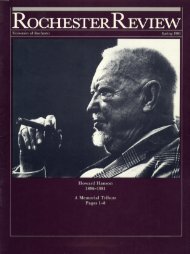Download PDF - River Campus Libraries - University of Rochester
Download PDF - River Campus Libraries - University of Rochester
Download PDF - River Campus Libraries - University of Rochester
You also want an ePaper? Increase the reach of your titles
YUMPU automatically turns print PDFs into web optimized ePapers that Google loves.
that all <strong>of</strong> the nation's young men upon attaining age<br />
18, shall, without exception or deferment, be immediately<br />
inducted for two years <strong>of</strong> training and military<br />
service.<br />
Under such a plan the nation would gain a relatively<br />
small number <strong>of</strong> trained fighting men (the<br />
equivalent <strong>of</strong> present freshmen and sophomore classes)<br />
but ultimately lose a large part <strong>of</strong> two generations <strong>of</strong><br />
college-trained specialists. Let us waive the obvious<br />
and questionable implication <strong>of</strong> the Conant Plan,<br />
namely, that we must or could successfully confront<br />
the enemy in Europe and Asia with adequate masses<br />
<strong>of</strong> manpower in the immediate future. Rather, we<br />
must decide whether 100,000 to 200,000 young men<br />
out <strong>of</strong> approximately 1,000,000 in each age group will<br />
determine the military outcome as effectively if immediately<br />
inducted, trained and sent to the fighting<br />
front as if permitted to complete college level and<br />
graduate training before being allocated to national<br />
service.<br />
It is true that manpower is scarce and that a three<br />
or three and one-half million man military force will<br />
be difficult to assemble. Whatever those difficulties,<br />
they can be surmounted by appropriate changes in the<br />
Selective Service law which will still permit the intellectually<br />
qualified wouth, selected by a nationally applied<br />
aptitude test and regardless <strong>of</strong> financial ability,<br />
to serve the nation after receiving further training<br />
rather than before.<br />
-R-<br />
The proposals <strong>of</strong> the six scientific advisory committees<br />
to General Hershey and those <strong>of</strong> the Association<br />
<strong>of</strong> American Universities and the Association <strong>of</strong><br />
Colleges and Universities <strong>of</strong> the State <strong>of</strong> New York all<br />
recognize the importance <strong>of</strong> ultimate national service<br />
for all young men. The first two, however, leave entirely<br />
to the military agencies the selection <strong>of</strong> those<br />
who will be inducted at once and those who will be<br />
permitted to complete a post-secondary school course<br />
in training. Left to the military also is the determination<br />
<strong>of</strong> the service which each shall perform.<br />
Only the New York State Association proposal includes<br />
the creation <strong>of</strong> a top-level civilian manpower<br />
allocation agency responsible for insuring the most<br />
efficient use <strong>of</strong> our scarce and precious manpower resources.<br />
This plan alone flatly and without equivocation<br />
permits national service after completion <strong>of</strong> an<br />
educational program at the level for which a youth's<br />
intellectual capacity fits him.<br />
Much has been said concerning the democratic<br />
methods with an indiscriminate immediate induction<br />
for military service <strong>of</strong> all our youth whatever<br />
their potential capacities may be. But democracy is<br />
not self-destructive. The common mold is a feature <strong>of</strong><br />
totalitarianism, not democracy. Let our educational<br />
leaders stand to their principles and as long as discussion<br />
is possible, press for the preservation <strong>of</strong> technically<br />
trained manpower as the nation's first resource in its<br />
critical hour.<br />
Program Sponsored on HOur Society in the �tomic Era"<br />
AN outstanding public lecture program <strong>of</strong> interest<br />
to all UR alumni and alumnae in <strong>Rochester</strong> and vicinity<br />
will be presented by the <strong>University</strong> on February<br />
16 and 23 on the central theme, "Our Society in the<br />
Atomic Era."<br />
Four nationally-known speakers will take part in<br />
the series, which will combine the annual Cutler and<br />
Rosenberger lectures. The first two addresses will be<br />
given in Strong Auditorium, <strong>River</strong> <strong>Campus</strong>. William<br />
L. Laurence, famed science writer for the New York<br />
Times) who won the Pulitzer Prize in 1946 for his<br />
eye-witness account <strong>of</strong> the atom-bombing <strong>of</strong> Nagasaki<br />
and subsequent 10 artides on the development, production<br />
and significance <strong>of</strong> the atom bomb, will speak<br />
at 3 p.m. on February 16 on "The Atomic Era."<br />
At 8 o'clock that evening, Sumner Pike, one <strong>of</strong> the<br />
8<br />
original members <strong>of</strong> the Atomic Energy Commission,<br />
who was acting chairman following the resignation<br />
<strong>of</strong> David Lilienthal and was reappointed a commissioner<br />
last November, will speak on "The Impact <strong>of</strong><br />
the Atomic Era on the American Economic System."<br />
Second part <strong>of</strong> the series will be held in Cutler<br />
Union on February 23. Dr. Quincy Wright, pr<strong>of</strong>essor<br />
<strong>of</strong> international law at the <strong>University</strong> <strong>of</strong> Chicago, and<br />
Dr. Margaret Mead, one <strong>of</strong> the world's leading an<br />
thropologists and associate curator <strong>of</strong> the American<br />
Museum <strong>of</strong> Natural History, will be the speaker. Dr.<br />
Wright's lecture will be at 3 p.m. on "World Gov<br />
ernment and the American Constitution," and Dr.<br />
Mead's at 8 p.m. on "The Individual in the Atomic<br />
'<br />
Era."<br />
The lectures are free and no tickets are required.


